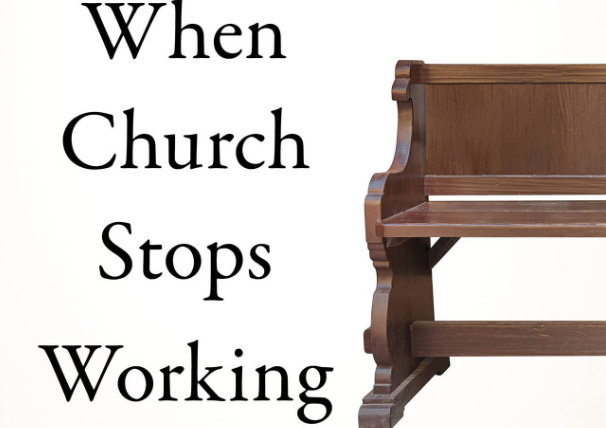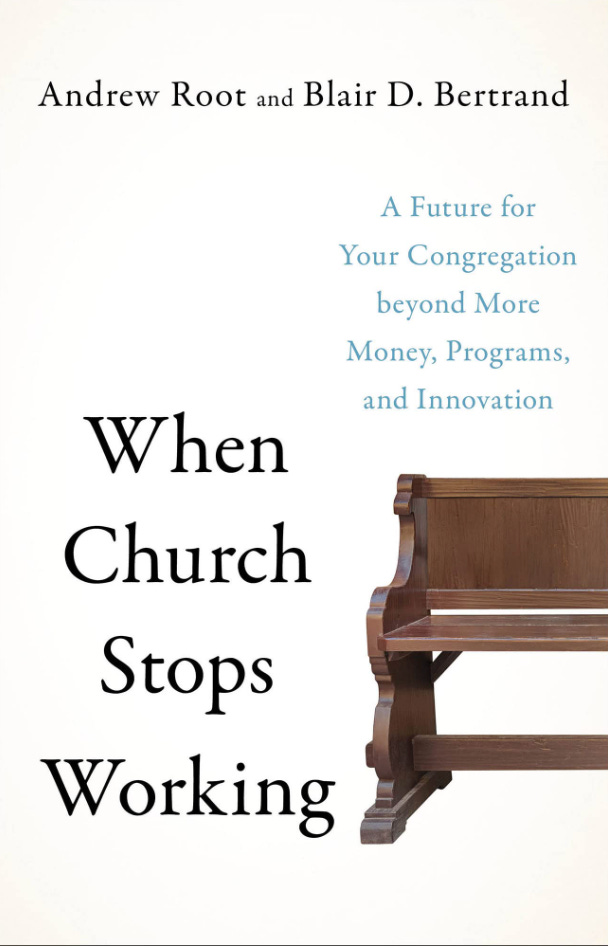The church’s problem is the secular age. We make the secular age worse because we see reality today with a secular lens. The essence of Andrew roots proposals, in a variety of publications and other media, is that we must shift from our pragmatic diagnosis of the problems we are facing in church decline, and turned to a deeper reality, namely we live in the secular age and we are using a secular lens to resolve a problem that cannot be solved by the secular lens in the secular age.
Pragmatics will not do it. More effort will not do it. Snazzy or programs will not do it. We've tried all these, and they are not genuinely resolving the secular age.
Our strategies for resolving the secular age and the secular lens include doing more and rushing. Neither will solve the problems because both are symptoms of the problem itself. In their new book, Andrew Root and Blair D. Bertrand propose that we wait for God to act, and when God acts we experience the crisis who is God! I think I’ve got their proposal right so far. Their book, again, is called When Church Stops Working with the subtitle of A Future for Your Congregation beyond More Money, Programs, and Innovation.
We want smooth. We want life to go well. We don’t want crisis. We don’t want frustration, glitches, or anxiety. But tension and crisis are at the heart of living in the Spirit.
Without tension there is no church community. The authors appeal to Dietrich Bonhoeffer in his famous book Life Together, which proposed that if we want to love the church and live the life of the church we have to abandon the idea of an idealized church. There is no smooth in the real church. “Because the church is the body of the embodied God, there can be no ideal church. Just the real community of the real bodies of real persons in real relationship.”
Without crisis there is no meeting of God. Many leaders in churches today want to return to “Happy Days are Here Again.” But not only were those days the days of smooth, we can't go back to those days. We only have our present that leads to our future, even if it emerges out of our past.
The authors are correct when they say this: “our attention has been almost completely on the crisis of decline. But the crisis we should be focused on – the crisis that is the heart of the church and not a tumor – is a crisis we can never escape and still be the Church of Jesus Christ. This crisis is weird, even mystical. It's the kind of crisis that doesn't ask us to do more, to hurry and to have as a way of stabilizing ourselves.” No, they argue, “The real crisis is encountering a living God who is God.”
Again, return to waiting to understand what they are calling the church today to be and to do: “This waiting even sends the church into the world to wait with the world for God's action to save the world. This crisis gives life.”
Those who read Andrew Root know his favorite thinkers. Not only Bonhoeffer, but also Kierkegaard. In this chapter the authors explore Kierkegaard’s Critique of Lutheran and Danish church life and theology and beliefs, but they explore Kierkegaard through this lens of waiting and crisis. That is, and this speaks to us today with force, “There are no human tactics or technologies, no religious mechanisms that can conjure up this God who is God.” So, they are arguing for churches today to challenge the secular age and the secular lens and the secular rush with the kind of waiting that yields the crisis of waiting for God to speak. They want us to “lean into the crisis” and not seek to resolve it.
But the only God that we can know, and here they explore modern theology, is the unknowable God who makes himself known as God chose to make Godself known, in Jesus Christ, in the embodied life of Jesus, and in the cross and resurrection.
If we cannot idealize the church, neither can we idealize God. We must accept the God as the God who is revealed.
God has chosen “very backward ways” as the chief forms of revealing God.
“We must wait for this revealing!”
“Faith is the crisis of knowing the true God by how God has revealed Godself in the world.”
“We are waiting in time for the eternal God to speak to us, to direct us, to lead us out in service to the world.”






WOW. Okay, we're on a search, a task with the tools that have served us in the past but are completely inadequate for this present search. Perhaps what gets in our way are our assumptions about the task: We tend to let methods get in the way of relationship. Or we ignore the things in Scripture that don't fit our grid (easily done!). For example, when the apostle John states that "Whoever does not love does not know God, because God is love," does this fact about God drive our thinking about the church's role in today's world? I think one of the best lines in today's post is this: “We are waiting in time for the eternal God to speak to us, to direct us, to lead us out in service to the world.” Waiting can be uncomfortable. We want to be doing. That may be our real problem.
Waiting requires discernment. When is waiting cowardice, or disobedience to the command to live my neighbor? This seems too simplistic and generic.